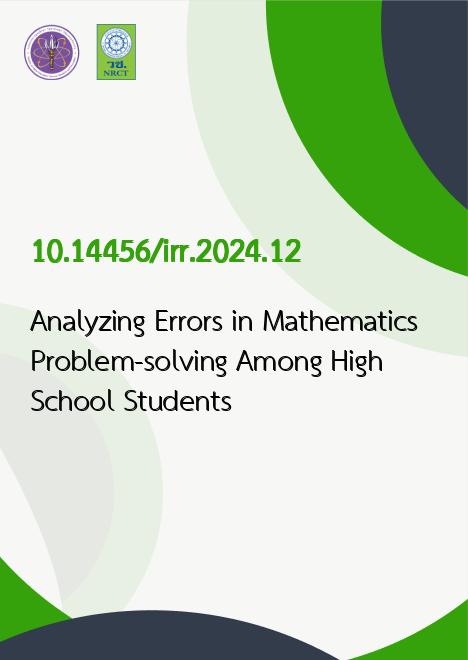
|
Analyzing Errors in Mathematics Problem-solving Among High School Students |
|---|---|
| รหัสดีโอไอ | |
| Creator | Ariel B. Mabansag |
| Title | Analyzing Errors in Mathematics Problem-solving Among High School Students |
| Contributor | Eva Mae P. Verzosa |
| Publisher | Phetchaburi Rajabhat University |
| Publication Year | 2567 |
| Journal Title | Interdisciplinary Research Review (IRR) |
| Journal Vol. | 19 |
| Journal No. | 5 |
| Page no. | 76-85 |
| Keyword | error analysis, reading comprehension, analytical ability, problem-solving in mathematics, mathematics education |
| URL Website | https://ph02.tci-thaijo.org/index.php/jtir |
| Website title | Interdisciplinary Research Review (IRR) |
| ISSN | 2697-536X |
| Abstract | This study explores the connection between math problem-solving skills and students' reading comprehension and analytical abilities. Problem-solving errors are common among elementary and high school students, notably in the Philippines, where math proficiency is subpar, emphasizing the need for enhanced problem-solving skills. This study examined errors made by 40 high school students when solving word problems and assessed how their reading comprehension and analytical skills affected these errors. Employing a quantitative correlational design, the study utilized standardized tests as its primary data collection tool. The data analysis involved various statistical measures such as frequency counts, percentages, mean, standard deviation, and chi-squared test for dependence to establish correlations. The findings unveiled that the majority of participants exhibited reading comprehension abilities at the instructional level and analytical abilities at the average level. Notably, the chi-square test results demonstrated a significant association between reading comprehension levels and the occurrence of problem-solving errors (Chi-square (8, N = 40) = 22.371, p = 0.004, contingency coefficient = 0.599). The errors mainly stemmed from difficulties in problem comprehension. The results underscore the need for focused reading comprehension interventions to improve students' math problem-solving skills. Furthermore, the study highlights the intricacy of cognitive processes in logical analysis, suggesting tailored support to address specific error patterns. In conclusion, this study offers insights into students' reading and analytical profiles and math problem-solving errors. It stresses the need for customized interventions to boost problem-solving skills and urges educators to address specific errors based on individual reading profiles. These results carry significant implications for improving mathematics education and enhancing teaching methods. |